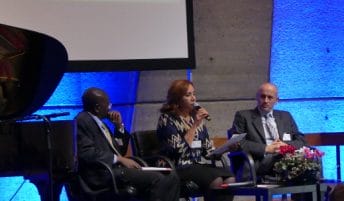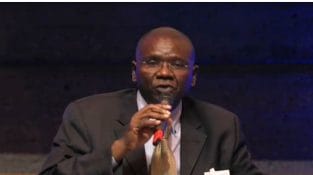 «In a world where globalisation dictates its laws, one of the most important paradoxes we are encountering is that the voice of the southern end of the world is being ignored. Though rich in natural resources like diamonds, gold, oil and other precious minerals, Africa faces: growing poverty and underdevelopment, the worst life expectancy, and a high level of illiteracy, despite the millions of dollars in western aid deposited along the years in various projects. Why? The dramatic response is not only the war we have to suffer, or diseases, but especially corruption which in Africa has become a normal and accepted fact, tearing the continent apart. It is a continent in which the poor have to be corrupt in order to survive, get treated in hospitals, enter one of the “best” professional schools, obtain jobs and get out of jail. Not even the laws are able to eradicate this evil. In most African countries, the law is of western origin, with some nuances taken from local cultures. Protection of the individual alone, for as much as is universally accepted, goes against the principle of the community, most dear to African traditions and that underline the importance of solidarity. The individual is such only if he belongs to a community and acts in function of the community. It is the principle of the “Ubuntu”: I exist because we exist. In the African culture, the Ubuntu is an invitation to support and help each other; it is the awareness of one’s own duties. This how Nelson Mandela put it: Ubuntu means to ask oneself, “Do I want to help the community around me to improve?” It is a rule of life based on respect for others, and a belief in a bond of sharing which unites all of humanity. It is a desire for peace. And yet, precisely in Africa, peace is lacking in many places and the remote cause of the conflicts is absurdly one’s own immense wealth. There are battles to control the minerals and the victims of these conflicts are the weakest people. In the effort to integrate one’s own values with those inherited from colonisation and in the face of the challenges of a world in which economic development gives the right to speak up, Africa is increasingly losing its own values, without acquiring the truly important ones. In my country, Cameroon, which is full of corruption, a small town arose. Chiara Lubich created it by carrying out social
«In a world where globalisation dictates its laws, one of the most important paradoxes we are encountering is that the voice of the southern end of the world is being ignored. Though rich in natural resources like diamonds, gold, oil and other precious minerals, Africa faces: growing poverty and underdevelopment, the worst life expectancy, and a high level of illiteracy, despite the millions of dollars in western aid deposited along the years in various projects. Why? The dramatic response is not only the war we have to suffer, or diseases, but especially corruption which in Africa has become a normal and accepted fact, tearing the continent apart. It is a continent in which the poor have to be corrupt in order to survive, get treated in hospitals, enter one of the “best” professional schools, obtain jobs and get out of jail. Not even the laws are able to eradicate this evil. In most African countries, the law is of western origin, with some nuances taken from local cultures. Protection of the individual alone, for as much as is universally accepted, goes against the principle of the community, most dear to African traditions and that underline the importance of solidarity. The individual is such only if he belongs to a community and acts in function of the community. It is the principle of the “Ubuntu”: I exist because we exist. In the African culture, the Ubuntu is an invitation to support and help each other; it is the awareness of one’s own duties. This how Nelson Mandela put it: Ubuntu means to ask oneself, “Do I want to help the community around me to improve?” It is a rule of life based on respect for others, and a belief in a bond of sharing which unites all of humanity. It is a desire for peace. And yet, precisely in Africa, peace is lacking in many places and the remote cause of the conflicts is absurdly one’s own immense wealth. There are battles to control the minerals and the victims of these conflicts are the weakest people. In the effort to integrate one’s own values with those inherited from colonisation and in the face of the challenges of a world in which economic development gives the right to speak up, Africa is increasingly losing its own values, without acquiring the truly important ones. In my country, Cameroon, which is full of corruption, a small town arose. Chiara Lubich created it by carrying out social  work in favour of the Bangwa people who were at risk of extinction but found salvation instead. But with this work, Chiara above all introduced a new lifestyle, drawing inspiration from the principle of fraternity: giving rise to a coexistence inspired by reciprocity in true justice, which squashes every quarrel, prevents conflicts, and finds solutions to problems also in the families; nobody steals, kills, and the “paths of peace” are pursued. Fraternity can thus become also a lawful principle for coexistence, change relationships in the name of acceptance and inclusion, and translate into solidarity, responsibility and mutual assistance. Peace is expressed today as development, security, universality of human rights, and respect for life: peace is a right, but awaits that lawfulness to be used as its tool. And for this, Declarations and Treaties will not suffice if expressed only in the singular sense, affirming the individual and giving room to interests and conflicts. The “universal” does not mean “absolute,” but “collective”; it is what unites otherwise there will be no relationships between individuals and cultures, or concepts that clash with each other . And if universality enclosed in human dignity allows relationships with each other, fraternity which is the new paradigm, may be the new inspiring principle until it “becomes” also part of the legal system that paves the way for peace. What is born in the heart and translated into coherent attitudes in daily life, will be able to transform relational conflicts into sharing, and ultimately into reciprocity, where what is due is given as a gift to others». Raphaël Takougang
work in favour of the Bangwa people who were at risk of extinction but found salvation instead. But with this work, Chiara above all introduced a new lifestyle, drawing inspiration from the principle of fraternity: giving rise to a coexistence inspired by reciprocity in true justice, which squashes every quarrel, prevents conflicts, and finds solutions to problems also in the families; nobody steals, kills, and the “paths of peace” are pursued. Fraternity can thus become also a lawful principle for coexistence, change relationships in the name of acceptance and inclusion, and translate into solidarity, responsibility and mutual assistance. Peace is expressed today as development, security, universality of human rights, and respect for life: peace is a right, but awaits that lawfulness to be used as its tool. And for this, Declarations and Treaties will not suffice if expressed only in the singular sense, affirming the individual and giving room to interests and conflicts. The “universal” does not mean “absolute,” but “collective”; it is what unites otherwise there will be no relationships between individuals and cultures, or concepts that clash with each other . And if universality enclosed in human dignity allows relationships with each other, fraternity which is the new paradigm, may be the new inspiring principle until it “becomes” also part of the legal system that paves the way for peace. What is born in the heart and translated into coherent attitudes in daily life, will be able to transform relational conflicts into sharing, and ultimately into reciprocity, where what is due is given as a gift to others». Raphaël Takougang
Put love into practice
Put love into practice




0 Comments